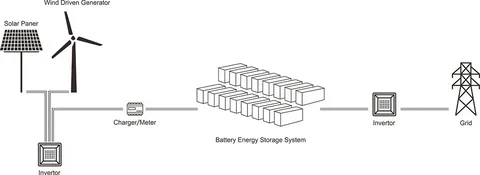The Battery Energy Storage System (BESS) market is at the forefront of the global transition towards sustainable energy solutions. As countries strive to meet ambitious climate targets and reduce reliance on fossil fuels, the integration of renewable energy sources like solar and wind has become paramount. However, the intermittent nature of these resources presents significant challenges. BESS plays a crucial role in overcoming these challenges, enhancing the integration of renewables and contributing to sustainable development.
The Role of BESS in Renewable Energy Integration
The integration of renewable energy sources into existing power grids is vital for reducing greenhouse gas emissions and promoting sustainable practices. However, the variability of renewables means that energy production can often be inconsistent. For instance, solar energy is abundant during sunny days but negligible at night, while wind energy fluctuates based on weather conditions.
Battery Energy Storage Systems provide a solution by storing excess energy generated during peak production times and releasing it when demand is high or generation is low. This capability ensures that renewable energy can be used effectively, minimizing waste and enhancing overall grid stability. By providing a reliable buffer, BESS enables utilities to manage the inherent variability of renewable sources, paving the way for a more resilient and sustainable energy system.
Enhancing Grid Stability and Reliability
One of the primary benefits of the BESS market is its ability to enhance grid stability and reliability. Traditional energy systems often struggle to balance supply and demand, particularly during peak periods when demand surges. This can lead to reliance on fossil fuel-based peaker plants, which are activated to meet short-term spikes in demand.
BESS offers an alternative by providing rapid-response capabilities to balance supply and demand in real time. This not only helps prevent blackouts but also reduces the need for backup generation from fossil fuels. Consequently, integrating BESS into the energy grid decreases greenhouse gas emissions and improves overall efficiency, contributing to sustainable development goals.
Facilitating Energy Transition in Emerging Economies
The BESS market holds particular promise for emerging economies, where access to reliable and affordable energy is often limited. Many of these regions are rich in renewable resources but lack the infrastructure to harness and distribute this energy effectively. BESS enables these economies to leapfrog traditional energy models by implementing decentralized energy systems that integrate renewable sources with storage solutions.
For instance, off-grid solar solutions equipped with battery storage are becoming increasingly popular in rural areas of Africa and Asia. These systems not only provide reliable electricity but also empower local communities by enabling access to energy for businesses and essential services. By enhancing energy access, BESS supports economic development and social equity, aligning with sustainable development goals.
Cost Reductions and Technological Advancements
The declining costs of battery technologies have significantly contributed to the growth of the BESS market. Lithium-ion batteries, which dominate the sector, have experienced dramatic price reductions over the past decade due to advancements in manufacturing processes and economies of scale. This trend is expected to continue as research into alternative battery technologies, such as solid-state and sodium-ion batteries, progresses.
Lower battery costs make energy storage solutions more accessible for both residential and commercial applications, further driving the adoption of renewable energy systems. As more households and businesses invest in solar panels coupled with battery storage, the overall demand for renewable energy will increase, creating a positive feedback loop that accelerates the transition to sustainable energy.
Environmental Benefits and Sustainability
The environmental benefits of BESS are multifaceted. By facilitating the use of renewable energy and reducing reliance on fossil fuels, BESS helps lower greenhouse gas emissions, thus mitigating climate change impacts. Additionally, the ability to store excess energy reduces waste, optimizing resource use and enhancing the overall sustainability of the energy system.
However, for the BESS market to reach its full potential, it is crucial to address the lifecycle impacts of battery production, usage, and disposal. Sustainable sourcing of raw materials, responsible manufacturing processes, and effective recycling programs are essential to minimize the environmental footprint of battery technologies. As the market evolves, the emphasis on sustainability will become increasingly important, ensuring that BESS contributes positively to the environment.
Conclusion
The Battery Energy Storage System (BESS) market is a cornerstone in the effort to enhance renewable energy integration and promote sustainable development. By addressing the challenges associated with the variability of renewable resources, BESS not only improves grid stability and reliability but also empowers emerging economies to harness their renewable potential.



